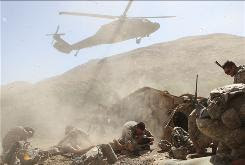
| By David Goldman, AP | |
| A helicopter lands Wednesday in Afghanistan to transport wounded soldiers after their vehicle was hit by a roadside bomb in Wardak province. By Gregg Zoroya, USA TODAY Military scientists have identified genes and proteins called biomarkers that could enable doctors to tailor personalized treatments for troops suffering traumatic injuries, such as those caused by roadside bombs. Researchers hope the troops will heal and recover faster, says Navy Cmdr. Eric Elster, a surgeon who co-authored the recent studies. Roadside bombs cause nearly 65% of the wounds suffered in Iraq and Afghanistan, according to Pentagon statistics. The bombs, also called improvised explosive devices or IEDs, have wounded more than 25,000 troops, records show. By examining blood, body tissue and fluids at the site of a blast wound, scientists were able to identify the biomarkers that predicted how the body's immune system will react, says Doug Tadaki, an immunologist and co-author of recent naval studies. The markers uncovered by the Navy research can help determine whether the gaping wounds left after a bomb explosion will fail and pull apart after surgery has been done to close the injury. Wound failure happens in about 17% of the cases where troops suffer multiple and severe wounds, commonly from blast, the Navy research shows. When failure occurs it can turn an war injury into a chronic ordeal, Elster says. The result of the research may ultimately lead to tailored treatment, Elster says. If doctors can read these biomarkers shortly after wounded troops arrive from the battlefield, they can anticipate how the troop's body will react. Research by Elster and other scientists at the Naval Medical Research Center also uncovered biomarkers that can predict whether troops suffering amputations from blast will develop painful bone spurs or abnormal bone growth at the site of amputation, a problem that occurs in about 60% of cases involving orthopedic injuries. Since 2003, about 850 troops have suffered major amputations, statistics show. These growths can interfere with the sizing and fitting of prosthetics and often require further surgery to remove. Wound failures and bone spurs occur in civilian cases where there are traumatic injuries, but at a far less frequent rate of occurrence, Tadaki says. Still, the findings could also impact the care of civilians hurt in car accidents or suffering gunshot wounds, says Grant Bochicchio, an emergency room surgeon and professor of surgery at the University of Maryland School of Medicine. "This has a lot of potential benefits, even in our patients," Bochicchio says. The Navy scientists — in two research studies published in May in the Journal of Bone and Joint Surgery and recently online in the Annals of Surgery— found that problems such as wound failures or bone spurs occur when the body's immune system overreacts to the wide spectrum of physical damage that occurs when a servicemember is caught in an explosion. Explosions can cause many injuries ranging from direct trauma from the explosion, to secondary wounds from flying debris or from the body being thrown against another surface, the researchers say. "Your body doesn't know how to deal with that, so your immune response turns on and stays on," Elster says in an interview. If the biomarkers suggest wounds could fail after surgery, scientists may soon develop ways to manipulate the immune system in an effort to control how it reacts. "It's really the introduction of personalized medicine," Elster says. | |
No comments:
Post a Comment